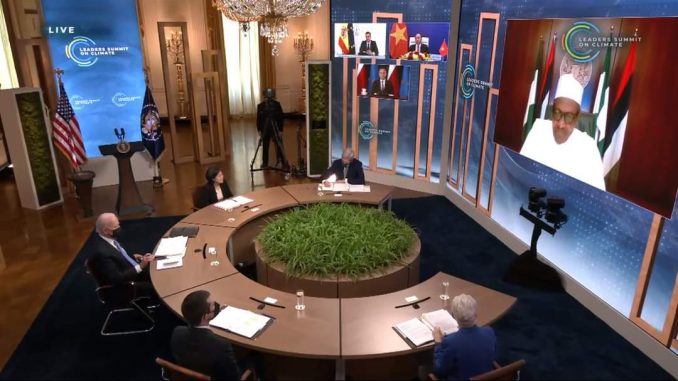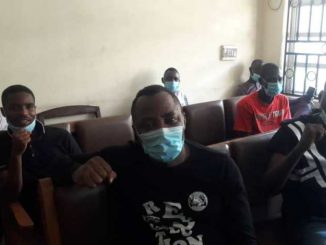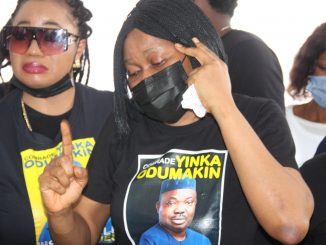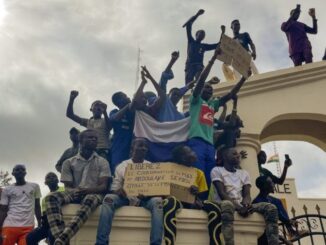
The United States has expressed its support for the Nigerian government’s solar power initiative aimed at delivering electricity to about 25 million Nigerians, thereby boosting the global clean energy target for nation states.
In the partnership project tagged Solar Power Naija recently launched by Vice President Yemi Osinbajo on behalf of the Federal Government, in Jigawa State, he informed that at least five million Nigerian homes would be electrified which would amount to 25 million Nigerians benefitting.
Recall the United Nations Goal 7 of the SDGs aims to correct the enormous imbalance in power distribution by ensuring everyone has access to affordable, reliable, and modern energy services by the year 2030, and to expand energy access, it is crucial to enhance energy efficiency and to invest in renewable energy.
To this end, the US Mission in Nigeria, expressing its government support in a Twitter post via its handle @USInNigeria wrote: “We also support bringing #cleanenergy to rural communities through Solar Power Naija. @PowerAfricaUS collaborates with @realREANigeria to expand energy access to 25 million people and to create 250,000 new jobs in the energy sector. #LeadersClimateSummit #RestoreOurEarth.”
Vice President Osinbajo in Jigawa State at the recent launch of #SolarPowerNiger had said the Federal Government will deliver electricity to about 25 million Nigerians whose communities are off the grid.
In Jigawa, during the flag off ceremony, Vice President Osinbajo, restated the determination of the President Muhammadu Buhari administration to ensure that millions of Nigerians gain access to cheap and environmentally friendly renewable power.
Coming under the Economic Sustainability Plan (ESP), Prof. Osinbajo, SAN, launched the take off of the Solar Power Naija programme in Jangefe Community in Roni Local Government Area (in the Kazaure Emirate) of the state, while assuring that it will get to all geopolitical zones in the country soon.
After Jangefe, the VP said, the rollout will continue “across the 6 geopolitical zones in Edo, Lagos, Adamawa, Anambra, Kebbi and Plateau. Other Solar companies are also in the pipeline for the Solar Power Naija facility to continue the march to 5 million connections during the life of this administration,” the Vice President said.
The scheme expected to create a new 250,000 jobs, according to government will be spread across the entire 36 states and the Federal Capital Territory (FCT), Abuja, covering 25million Nigerians in the end.
The commencement of the Solar Power Naija programme means the community will get 1,000 Solar Home Systems connections for its about 5,000 population.
The Vice President, flagged off the commencement of the installation in Jigawa, in what is part of a 100,000 scheme with A-SOLAR, a local solar power company implementing aspects of the ESP Solar Power Naija scheme.
ALSO READ: Osinbajo to US: Support just transition to net-zero emissions, global access to COVID-19 vaccine
The Jangefe community in Jigawa, which is the first location to be covered by the A-Solar company, will pay monthly energy payments until the systems are fully paid for at the point in which there will be a transfer of ownership to each consumer in the community.
The Vice President noted that the “President had emphasised that we could no longer rely solely on the grid if we were to electrify the whole country. Which meant that we had to develop an effective strategy for decentralizing power supply. Two obvious things to do were, first to think of implementing more off-grid solutions and to use renewable energy especially solar power.”
“Another challenge turned opportunity was Covid-19 and our response to the economic fallouts of the pandemic – the Economic Sustainability Plan. A fundamental rationale for the plan was to retain existing jobs and create new jobs. A mass solar programme seemed like a real chance to kill several birds with one stone; electrify the country and in the process, create thousands of jobs from solar assembly and manufacturing plants to installers, payment system operators, and maintenance of solar systems once installed.
“Mr. President, therefore, approved the inclusion of what came to be known as the Solar Power Naija programme in the Economic Sustainability Plan which he asked me to chair.
“The Solar Power Naija programme which is designed by the Rural Electrification Agency is an ambitious initiative that aims to create 5 million connections through a N140 billion financing programme that will support private developers to provide power for 5 million households, which means providing electricity for up to 25 million Nigerians.
Prof. Osinbajo further stated that the solar power programme is a public-private sector partnership supported by concessionary lending via the Central Bank of Nigeria and commercial banks.
The VP noted that structures have been put in place to make the connections costs affordable for all.
“In addition to the concessionary lending rates, the Government has provided subsidies and rebates for private developers to the tune of over $200 million under the Rural Electrification Agency and World Bank Nigeria Electrification Programme. The programme incorporates several innovative solutions to increase affordability for the citizens while also providing sufficient comfort to investors and financiers alike,” he stated.
The VP added that Jangefe community would derive several benefits from the flag off of the programme in Jigawa State.
The Vice President commended the Jigawa State Governor, Alh. Badaru Abubakar, His Royal Highness, the Emir of Kazaure, the Emirate Council and the Local Government of Roni, as well as other critical stakeholders for their roles in ensuring the implementation of the programme in the community.
He said, “the Governor’s style of engagement and focus on economic growth and cooperation by bringing people together is one of the reasons why it was so easy to execute this project in Jigawa. This mindset and approach of the Jigawa State administration created the environment for the Local Government Authority and the Emirate Council to work in harmony with the developers to make this project a reality. This is probably why Jigawa State will continue to attract investments for the benefit of its people and the country at large.”
The Vice President also commended the Emir of Kazaure, His Royal Highness, Alhaji Najid Hussaini Adamu who made a down payment for the community to benefit from the solar connections. Prof Osinbajo said not only was this a good example, but it also facilitated the programme.
He also noted the diligent efforts of the Special Adviser to the President on Infrastructure, Ahmad Rufai Zakari “in coordinating with all the relevant parties to lead us to the successful launch of the programme today.”
Earlier in his remarks, Jigawa State Governor Alhaji Abubakar Badaru commended both President Buhari and Vice President Yemi Osinbajo, saying the Federal Government’s support to the State and other States despite declining resources, has been unprecedented since 2015. He mentioned how the Buhari administration gave a bailout to States of the Federation to pay salaries and also the payment of the long outstanding refund from the Paris Club debts among others.
He said the solar project like many other schemes that have been implemented will positively impact the economy of the state in line with the vision of the President and his deputy.
The Governor noted that the school feeding programme and other schemes implemented by the Federal Government in the state have, aside from impacting the economy, improved school enrollment from about 600,000 to over a million since implementation.
After the flag-off of the scheme, the Vice President visited the family of Alhaji Auwalu Dauda, a beneficiary of the programme in Jangefe to interact with them on the impact of the programme.
Meanwhile, President Muhammadu Buhari on Friday assured international community of Nigeria’s preparedness to galvanize relevant stakeholders for climate action, and readiness to support regional, continental and global multilateral processes for attainment of the objectives of the Paris Agreement.
Speaking at a Virtual Leaders Summit on Climate, the President said the fight to redress the impact is the responsibility of all countries and stakeholders, congratulating President Joe Biden of the United States for renewed interest in the Paris Agreement.
“I would like to express my profound appreciation to the President of the United States, His Excellency, Joe Biden, for convening this Summit at a time the world is experiencing tremendous vulnerability from the COVID-19 pandemic and Climate Change impacts, among several other global challenges.
“The issue of Climate Change has taken the front burner globally, as its effects can be seen and felt all around us; ranging from increased atmospheric temperature to irregular rainfall patterns as well as sea level rise owing to the melting of glacial ice.
“Nigeria commends the Biden Administration for the positive decision of returning the United States to the Paris Agreement. In addition to bringing about abundant green economic opportunities to the US economy, the move further complements the larger transition process of global economies to low carbon development pathways,’’ he said.
The President said the Summit would prove instrumental in galvanizing high-level political support for the implementation of the Paris Agreement and its Katowice Rulebook as well as inviting more countries and stakeholders to take more climate-oriented responsibilities.
President Buhari told world leaders that Nigeria was one of the most vulnerable nations, and it had started undertaking major environmentally sound and climate-friendly programmes, while treading the path of sustainability.
“We are expeditiously implementing programs that stimulate gradual transition away from the use of wood stoves to kerosene, Liquefied Natural Gas, biogas and electricity. The immediate effects include healthy competition among private sector players leading to higher productivity, employment and faster service delivery.
“In the Agriculture production and supply chain sector, we are targeting improved efficiency and productivity through the provision of accurate and timely weather forecasting to farmers, supply of drought tolerant and early maturing crop varieties and promoting empowerment towards the diversification of sources of livelihoods.
“Beyond ending gas flaring by 2030, the oil and gas sector has undertaken steps for diversification; risk management system; insurance hedging; research and development and emergency/crisis planning,’’ the President added.
President Buhari said the overall outcome of the highlighted actions had translated into food supply sufficiency, improved nutrition, less hunger, increased employment, new jobs opportunities, better livelihoods, reduced poverty, decreased vulnerability to health challenges and higher quality of life.
“Nigeria calls on countries to embrace Circular Economy and Sustainable Production and Consumption models in order to expedite attainment of the long-term goals of the Paris Agreement,’’ the President added.




